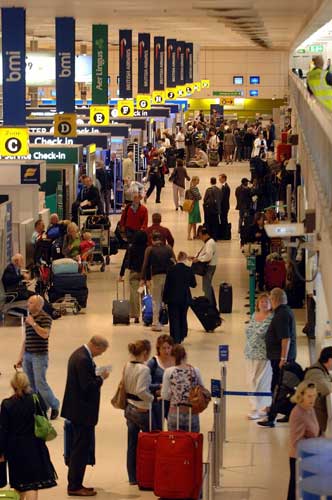Green fears over future of air travel

Your support helps us to tell the story
From reproductive rights to climate change to Big Tech, The Independent is on the ground when the story is developing. Whether it's investigating the financials of Elon Musk's pro-Trump PAC or producing our latest documentary, 'The A Word', which shines a light on the American women fighting for reproductive rights, we know how important it is to parse out the facts from the messaging.
At such a critical moment in US history, we need reporters on the ground. Your donation allows us to keep sending journalists to speak to both sides of the story.
The Independent is trusted by Americans across the entire political spectrum. And unlike many other quality news outlets, we choose not to lock Americans out of our reporting and analysis with paywalls. We believe quality journalism should be available to everyone, paid for by those who can afford it.
Your support makes all the difference.An alarming vision of UK air travel in 2040, with airports closing and passengers reluctant to fly for fear of being "ungreen" was unveiled today.
In 30 years time, the UK air transport network could stagnate and air travel will be mainly confined to long-haul routes, according to various scenarios in the report by the Institution of Civil Engineers (ICE).
But one ICE scenario also suggested that a "laissez-faire" attitude could lead to an aviation boom by 2040 with global emission targets not being met.
ICE vice president Peter Hansford stressed the scenarios were not predictions for the future but "highlighted the need for Government, politicians and industry to develop new thinking to take account of the pressures that could dramatically transform air transport and airport infrastructure in the future".
The four scenarios of how UK air transport and airport infrastructure could look in 2040 were:
* VORTEX OF DESPAIR: Airports become a political football leading to stagnation. Disposable income shrinks and the cost of travel increases. There is high unemployment, levels of immigration are a concern and disposable income shrinks. Emission reduction targets become tougher. Some regional airports close, others are sold;
* ECO ANGST: Climate change concerns hit air travel. Those who need to travel by air do so discreetly for fear of vilification. Environmental lobbyists and civil society groups denounce air travel despite technology gains. There is a shift to rail for shorter air journeys. Many regional airports close and international airports are nationalised;
* BIG STICK: The Government encourages a reluctant domestic population to shift transport modes, driven primarily by political concerns about climate change. Short-haul air travel is forcibly migrated to rail within an integrated national transport strategy. Road pricing is introduced and rail fares are subsidised. The cost of flying is generally high, but those who can afford to continue to fly;
* LAISSEZ-FAIRE: The global economy has grown rapidly and credit is cheap and plentiful. Taxation measures benefit the aviation industry. Airport infrastructure is developed and there is better surface access to airports. Despite the advance in technology global emissions targets are not met. The impacts of extreme, sudden climate change begin to take hold and adaptation becomes a priority; the UK's largest airports build flood defences.
ICE aviation spokesman Simon Godfrey-Arnold said: "Planning for the future demand for air transport is generally uncertain, but we hope the creation of the four scenarios will move the discussion beyond some of the immediate talking points surrounding individual projects and encourage a broader consideration of the future shape of UK aviation as a whole.
"There are a number of very important, strategic questions that need to be resolved now if we are to provide the infrastructure solutions needed for the future."
Join our commenting forum
Join thought-provoking conversations, follow other Independent readers and see their replies
Comments